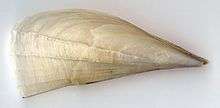Atrina fragilis
Atrina fragilis, the fan mussel, is a species of large saltwater clam, a marine bivalve mollusc in the family Pinnidae, the pen shells.
| Fan mussel | |
|---|---|
 | |
| Scientific classification | |
| Kingdom: | Animalia |
| Phylum: | Mollusca |
| Class: | Bivalvia |
| Order: | Pteriida |
| Family: | Pinnidae |
| Genus: | Atrina |
| Species: | A. fragilis |
| Binomial name | |
| Atrina fragilis (Pennant, 1777) | |
| Synonyms | |
|
Pinna fragilis | |
The fan mussel is one of the largest (30 to 48 cm long) European bivalve molluscs. It is one of the rarest species of marine mollusc in the United Kingdom - so rare that surveys of nearly 9,000 sites around Britain between 1987 and 1998 found none.[1]
Description
The shell of the fan mussel tapers to a point at the umbos, and is very brittle. It is yellowish to dark brown with blackish patches. The two valves are equal and triangular in outline, with prominent gapes. The shell surface has a sculpture of concentric lines and 8 to 12 ribs, which may have fluted spines. Shells can reach 48 cm in length, and the largest individuals may be 10 to 12 years old. Also have been found in the Mediterranean Sea.
Biology
This species lives with the narrow half of its shell anchored in the sediment, but the large part of the fragile shell protrudes from the sea floor. Thus, unfortunately it is vulnerable to damage by fishing trawlers.[1] The species is also vulnerable to industrial activity.
The shells are anchored to the sand by fine gold-coloured silk produced by special glands. This silk or byssus are fine threads which historically was used to make special royal fabrics. This was called Pinna silk or sea silk, although the species more frequently used was Pinna nobilis of the Mediterranean.
Conservation
The fan mussel is a protected species in the United Kingdom, under the Wildlife and Countryside Act 1981 - since 1998 has been a crime to kill, injure, possess or sell fan mussels.[2] The United Kingdom Biodiversity Action Plan designates it a Priority Species for conservation.[3]
Footnotes
- "Rare giant fan-shells found in Plymouth Sound". Devon Great Outdoors. BBC News. 28 July 2004. Archived from the original on 2005-12-18. Retrieved 2016-01-01.
- Protection for wild animals on Schedule 5 of the Wildlife and Countryside Act, 1981. Website accessed 7 August 2009.
- "UK BAP priority marine species". UK BAP priority species. Joint Nature Conservation Committee. 2014-12-19. Archived from the original on 2015-09-12. Retrieved 2016-01-01.
References
- Anon, 1999 Atrina fragilis (a fan shell). Species Action Plan. In UK Biodiversity Group. Tranche 2 Action Plans. English Nature for the UK Biodiversity Group, Peterborough
- Simunovic, A, Piccinetti, C., Bartulovic, M, and Grubelic, I 2001 Distribution of Atrina fragilis (Pennant, 1777) (Pinnidae, Mollusca Bivalvia) in the Adriatic Sea. Acta Adriatica 42(1): 49-59
- Woodward F R 1985. The Fan-mussel, Pinna fragilis Pennant in Scotland. Glasgow Naturalist 21: 63-69.